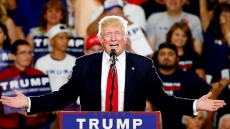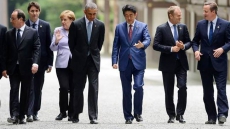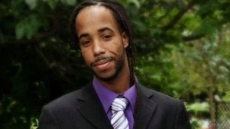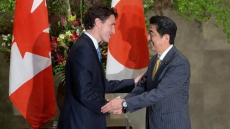WASHINGTON — U.S. news networks devoted a half hour's worth of coverage the other day to an inanimate object: the stage upon which Donald Trump would eventually speak.
They wouldn't allow their empty-stage coverage to be interrupted by the fact that a leading presidential candidate happened to be on another stage speaking at that very moment.
Hillary Clinton was delivering a speech on the middle-class agenda at a union event while networks like MSNBC and Fox had anchors filling airtime with small talk in anticipation of Trump's arrival.
Clinton may be leading most presidential polls. But when it comes to grabbing media attention, it seems, nobody trumps Trump.
Democrats have quickly resigned themselves to the reality of running against a stunt-happy showman who steals the spotlight by any means necessary.
"The reality of Donald Trump is he's going to dominate the news. He's going to dominate the news cycle," Clinton's communications director, Jennifer Palmieri, told two of her former colleagues in the Obama White House this week in their podcast, "Keepin' It 1600."
"(But) there's a difference between dominating the news cycle, and driving the debate."

Trump wrote three decades ago in his first book that he does outrageous things to get his name in the news — and he's remained true to his word.
Dominance of the media was a secret of Trump's success in the Republican primaries.
He achieved a multitude more airtime than his Republican rivals, forcing them to exhaust their advertising budgets to get some attention while he got on TV for free.
That doesn't mean he can necessarily ride a wave of PR stunts into the White House.
Trump's advantage in media airtime narrowed later in the primaries. Its value going forward is debatable, according to some political-science research outlined in the book, "The Gamble," which suggests media attention sways voters less in a general election than in a primary.
Does the American public even want all this Trump coverage? Perhaps not, suggests media-analytics site Parse.ly. In a blog item titled, "The Media's Obsession With Trump Isn't Justified By Data," it analyzed more than one billion webpage clicks and more than 100,000 online articles since November.

It found Trump has appeared in more than twice as many news stories as Clinton. But online articles about him got slightly fewer clicks, on average, than those about Clinton, Sen. Ted Cruz, or in some months Bernie Sanders.
Palmieri even questions the electoral value of this attention.
"More coverage for him doesn't necessarily mean good coverage for him," said the Clinton aide.
For example, she alluded to his floating murder conspiracy theories about former Supreme Court Justice Antonin Scalia; White House aide Vince Foster; and about the Kennedy assassination.
She also cited his plan to deport millions of undocumented residents, and his willingness to cite the possibility of printing money as a solution to U.S. debt problems.
In the last few days alone he's recycled old rape allegations against Bill Clinton and fomented a drama about whether he'd debate Sanders in a televised charity-benefit event — after the idea had made some news, he announced he wouldn't do it.
A Clinton campaign supporter says she won't be distracted by his daily noise.

"He tries to say as much outrageous stuff as he can, with the idea of provoking his opponent," said Gordon Giffin, a former ambassador to Canada who advises and raises funds for the Clinton campaign.
"That strategy won't work with her. I don't think she'll be provoked. I think she'll be steady, straightforward, and run the campaign that she has in mind — unrelated to whatever kind of outrageous comments he makes."
But there's little doubt that the unusual nature of his candidacy means this election has revolved around Trump.
He generates multiple times more Google searches than Clinton — 2 1/2 times this month, according to Google Trends.
Even the Democrats are building fundraising efforts around him.
His name and photo appear prominently in emails requesting donations to the Democratic National Committee for what the party even calls its Stop Trump Fund.
"It's official," said a note from the Democratic party last week, on the day of the empty-stage coverage. Media reports that day estimated Trump had secured the necessary number of delegates to guarantee his nomination.

"This guy is the Republican nominee for president."




